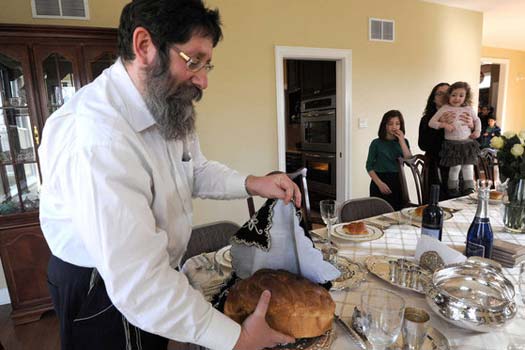
Living, Breathing Faith
Despite the number of cooks in the kitchen, preparations to create a Shabbat dinner were moving smoothly.
That’s no small feat, and this was no small event – not just because the Mangels are a family with eight children, ages 3 to 19. At least eight guests were coming over, half of the children were returning from schools in three states to spend the weekend in Cherry Hill, and their parents – Rabbi Mendel “Mendy” Mangel, 45, and Dinie Mangel, 40, lead the Chabad Lubavitch of Camden and Burlington Counties.
That means before the sun goes down on this Friday evening, he will field numerous cellphone calls, and she’ll be checking on the purity of the mikvah’s water while preparing a five-course meal for at least 18.
It’s a scene that traces its origins to 1994, when the couple – then new parents of a 6-month-old daughter – arrived in South Jersey not knowing a soul.
“But we knew what our mission was,” Dinie says, “and it’s a work in progress.”
That mission is to reach out to all Jews in the area – no matter their affiliation – and to help them celebrate and rejoice in their Judaism as part of a worldwide movement with roots in late-17th-century Eastern Europe.
There are now 21 Chabad centers in the Philadelphia area, with seven in South Jersey, and although the Mangels’ center started in a donated storefront at a Voorhees shopping center with only about 20 worshippers, today the Cherry Hill Chabad has a free-standing synagogue, a Hebrew school, a summer camp, a winter vacation camp, and a new ritual bath. About 600 worshippers attended High Holy Day services last year.
Overseeing such an operation – as well as parenting eight – requires “a very deep commitment,” Mendy says. It’s also one that demands negotiating a delicate balance between the modern world and a traditional one.
The Mangels dress like Orthodox Jews – white shirt, black trousers and yarmulkes for men and boys; modest skirts or dresses for girls, and fashionable wigs for women – but they work with Jews of all backgrounds.
“We have our own rules, but we certainly know that other Jews do not necessarily live as we do,” Dinie says. “We accept that, and also want our children’s lives to have richness and experiences that are not totally insular.”
There is no TV in the Mangel household, nor do they attend movies. But parents and the older children make use of the Internet, with the children accessing only very limited, carefully screened sites.
“Rather than shun the Internet, we use it to help further their Jewish education,” Dinie says. “We want them to see Jewish life and survival in the midst of a multicultural society.”
And while family is at the center of Chabad life, before they were married, Dinie and Mendy each traveled and studied extensively – Mendy in Australia, Japan, Russia, and Scandinavia, and Dinie to Canada, Australia, and the former Soviet Union.
“This was not just leisure, see-the-world travel,” Mendy recalls of his experience. “Its purpose was to expose us to the larger world of Chabad, and it certainly gave us a sense of independence.”
The international travel has another purpose: with Chabads spread around the globe, parents know their children may eventually end up in far-flung places, so familiarizing them with the world is deemed an important experience.
Carrying on that tradition, Dinie has put her 9- and 10-year-old children on airplanes to U.S. destinations to experience special Chabad programs and camps. “We want them to spread their wings – always safely, but sometimes without us.”
Cellphones, too, are indispensable, part of the detours from what sometimes seems like living in another century.
In so many ways, Dinie is like other working women with that infamous “second shift.” An accomplished multitasker, she runs the household but also conducts programming and services for women in areas as disparate as spirituality and graphology, the beauty and power of women, and even a recent chocolate tasting.
Mendy navigates the world as a CEO would, supervising budgets, strategic planning, marketing, and PR.
But on Friday afternoons, the kitchen is command central. Sooner or later, everyone is in it.
Eliezer, 18, the Mangels’ oldest son, is busy at the sink. Studying at a yeshiva in Baltimore, he returns for weekends when he can.
“Helping others is what we are here for,” he says as he guides his younger siblings with their chores.
Chaya, 19, the oldest, attends a Jewish school for girls in New York. Unlike her mother, who didn’t complete her college education, Chaya plans to earn her teaching degree within the yeshiva school system. Still, she says, “my mother is my role model.”
Chana, 16, is home from studies at a Brooklyn Jewish academy, and Yakov, 14, has arrived from his Hebrew academy in Connecticut. He had traveled with his aunt, uncle, and their four sons, who were to be Shabbat guests.
The variety of schools is based on the theory that the older children need exposure to life away from home. “Also, each child has different needs and temperaments,” says their mother, who has enrolled Sara, 12, Fayga, 9, and Berel, 6, at an Orthodox day school in Cherry Hill. Sara is often the on-site babysitter for her younger siblings, including Luba, 3.
“I definitely, absolutely want to be a mom,” she says. “I love being in a big family.”
For Dinie, at least, it’s a lot to supervise. So how does she do it?
“I don’t require very much sleep,” she jokes.
At sundown, the Mangel family will light the Sabbath candles, gather at the table for dinner, then walk down a short path to the synagogue. On Saturday afternoon, after services, they will enjoy another meal together with more guests.
It’s a life that’s very different from many of their South Jersey neighbors. Nonetheless, the Mangels feel connected to their community.
Mendy likes to tell the story of going out to the all-night supermarket and encountering a woman in a long sari.
“We looked at one another and didn’t say a word – but we both smiled,” he recounts. “That smile said that, yes, we’re different – but in so many ways, we’re also the same as those around us. That’s the blessing of diversity in this wonderful country.”















MR
Rabbi Mangel you are the best!
Rabbi Mangel
You are definitely the best shliach for explaining the workings of Shabbos and the tradition (Chabad Style)
Good Work and A Good Year.
Sydney Yeshiva
Mendy
very nice article keep up the good work